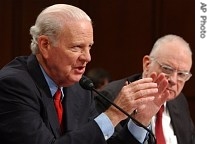2006年VOA标准英语-Analysts: Help on Iraq to Have Diplomatic Cost(在线收听)
By Gary Thomas
Washington
07 December 2006
Central to the recommendations of the Iraq Study Group report is its call to get Iraq's neighbors involved in helping stabilize the country. But, as VOA correspondent Gary Thomas reports, getting their help is expected to have a high diplomatic cost.
 |
| Iraq Study Group Co-Chairmen, former Secretary of State James A. Baker III, left, and former Indiana Rep. Lee Hamilton discuss their Group's report while testifying before the Senate Armed Services Committee |
But at what political or diplomatic cost? Larry Wilkerson, who was chief of staff to former Secretary of State Colin Powell, says that even if the United States is willing to sit down with officials of Iran and Syria to seek their help on Iraq, the price for their cooperation is likely to be high - perhaps too high for the United States to pay.
"This is a recommendation that has been around for some time, along with some of the others, and should have been implemented a long time ago when the price was much lower," said Mr. Wilkerson. "With the strategic leverage, for example, that we have now afforded Iran, and Syria too, by its affiliation with Iran which, incidentally, we compelled - the price to pay for any negotiation is so much higher now that I'm not sure that any American president would be willing to pay it."
The Bush Administration has adamantly refused to talk to Iran and Syria. At a joint press conference with British Prime Minister Tony Blair Thursday, President Bush said he would not even consider talking with either country unless there is significant change in Iranian and Syrian behavior.
"If people come to the table to discuss Iraq, they need to come understanding their responsibilities to not fund terrorists, to help this young democracy [in Iraq] survive, to help with the economics of the country," said Mr. Bush. "And if people are not committed, if Syria and Iran are not committed to that concept, than they shouldn't bother to show up."
He also reiterated his call for Iran to halt uranium enrichment as a pre-condition to U.S. participation in any direct talks. The United States and its allies say Iran is determined to build nuclear weapons. Iran denies this, saying it only wants peaceful nuclear energy.
In 2003, Iran made a secret overture to the United States to open talks on any number of issues, including its nuclear program. The Bush Administration rejected the offer. Larry Wilkerson says the administration was riding high at the time from its swift military victory in Iraq, and an opportunity was thus lost to enlist help at less political or diplomatic cost.
"We were sitting in Baghdad with roughly 140,000 or 150,000 troops who had just shocked and awed all the way to Baghdad. In two months the Iraqi government had fallen, the army had disappeared," he noted. "And people in Damascus, people in Tehran were wondering, were they next? This is a maximum [point of] leverage. And to turn down an opening from the other people from whom you needed to negotiate was simply stupid, but we did it."
Now a more hard-line government sits in Tehran. Some analysts say Iran may seek concessions on the nuclear issue in return for help in Iraq.
But Gary Sick, a former National Security Council staffer in the Carter Administration and a leading expert on Iran, says Tehran may not be ready to deal. He says Iran only wants U.S. troops out of its neighboring state, and that it is not thinking about the regional consequences such a move might bring.
"That is an objective of theirs," he said. "So they have very little reason to cooperate with us to try to stabilize the situation until the U.S. forces are gone. So Iran sees that it is now in a position to win without doing much of anything. And it worries me very much, because the Iranians seem to have no concept of what's going to happen after American forces are gone, or what happens if Iraq in fact descends into total chaos and a full-fledged civil war."
As for Syria, it may have its own price for cooperation in stabilizing Iraq. Murhaf Jouejati, director of the Middle East studies program at George Washington University and an expert on Syrian politics, says it is Israel's return of the Golan Heights.
"Syria is not going to do this solely for the United States," he said. "It's going to need something in return. I think a return to Lebanon, a Syrian return to Lebanon, is out of the question. But one legitimate Syrian demand is the resumption of peace talks with Israel in view of the return of the Golan Heights to Syrian sovereignty."
But that may be too high a price for Israel to pay, at least for now. Israeli Prime Minister Ehud Olmert told newspaper editors he has no intention of opening talks with Syria, and rejected the Iraq Study Group report's linkage between solving the Arab-Israeli conflict and stabilizing Iraq